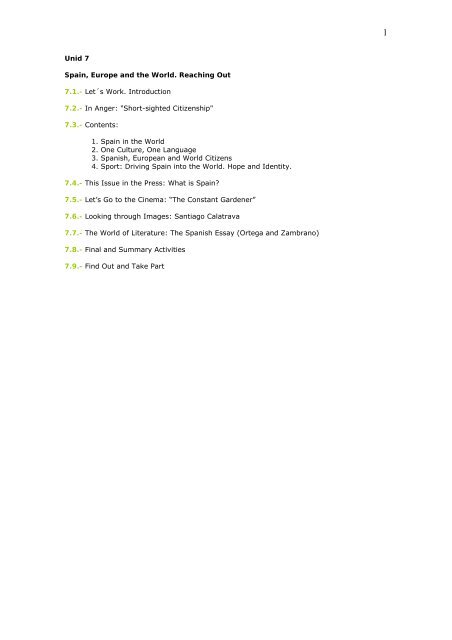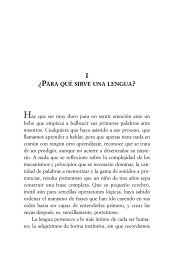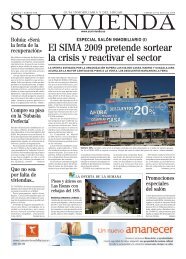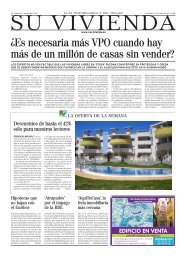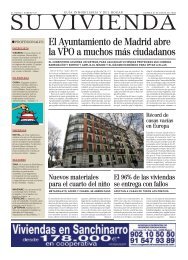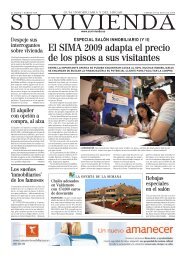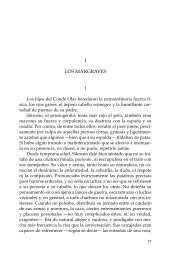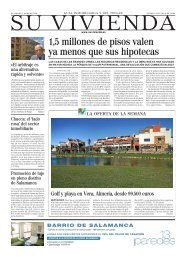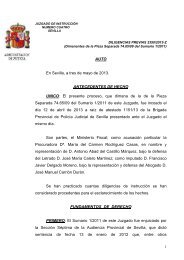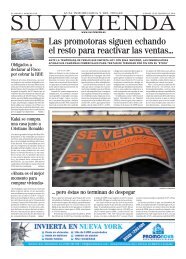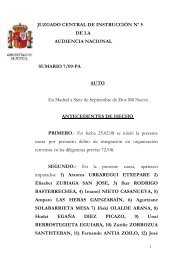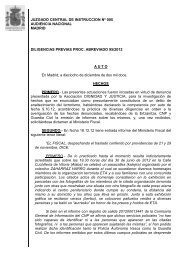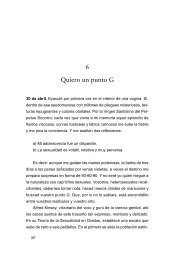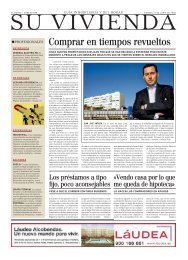UNIDAD 7: Spain, Europe and the World - El Mundo
UNIDAD 7: Spain, Europe and the World - El Mundo
UNIDAD 7: Spain, Europe and the World - El Mundo
Create successful ePaper yourself
Turn your PDF publications into a flip-book with our unique Google optimized e-Paper software.
Unid 7<br />
<strong>Spain</strong>, <strong>Europe</strong> <strong>and</strong> <strong>the</strong> <strong>World</strong>. Reaching Out<br />
7.1.- Let´s Work. Introduction<br />
7.2.- In Anger: "Short-sighted Citizenship"<br />
7.3.- Contents:<br />
1. <strong>Spain</strong> in <strong>the</strong> <strong>World</strong><br />
2. One Culture, One Language<br />
3. Spanish, <strong>Europe</strong>an <strong>and</strong> <strong>World</strong> Citizens<br />
4. Sport: Driving <strong>Spain</strong> into <strong>the</strong> <strong>World</strong>. Hope <strong>and</strong> Identity.<br />
7.4.- This Issue in <strong>the</strong> Press: What is <strong>Spain</strong>?<br />
7.5.- Let’s Go to <strong>the</strong> Cinema: “The Constant Gardener”<br />
7.6.- Looking through Images: Santiago Calatrava<br />
7.7.- The <strong>World</strong> of Literature: The Spanish Essay (Ortega <strong>and</strong> Zambrano)<br />
7.8.- Final <strong>and</strong> Summary Activities<br />
7.9.- Find Out <strong>and</strong> Take Part<br />
1
7.1.- Let´s Work<br />
1. The characteristics that define an active <strong>and</strong> critical citizenship.<br />
2. The position of <strong>Spain</strong> in <strong>Europe</strong> <strong>and</strong> <strong>the</strong> world, both geographically <strong>and</strong> historically.<br />
3. The importance of language for citizens <strong>and</strong> <strong>the</strong> importance of <strong>the</strong> Spanish language<br />
in <strong>the</strong> world.<br />
4. Some of <strong>the</strong> most important <strong>Europe</strong>an institutions.<br />
5. The contribution of important thinkers, artistic creation or sport to <strong>the</strong> construction of<br />
a national identity.<br />
Introduction<br />
Citizenship does not only concern us; meanwhile, on <strong>the</strong> o<strong>the</strong>r h<strong>and</strong>, it cannot it be<br />
clearly categorised. Every community develops <strong>and</strong> changes depending on its citizenship.<br />
This is <strong>the</strong> reason why <strong>the</strong> term “citizen” does not only refer to our city, or even, in a wider<br />
sense, our region <strong>and</strong> country. Being citizens means being part of <strong>the</strong> world, this wide world.<br />
We cannot only be citizens of our city; we must open up to international citizenship.<br />
In <strong>the</strong> same way as we have an interest in <strong>the</strong> development of a participative <strong>and</strong><br />
critical citizenship in our closest environment, our concerns should also shift to o<strong>the</strong>r levels<br />
of citizenship. We have to move from particularity to universality, that is, from <strong>the</strong> local to<br />
<strong>the</strong> global. Being a citizen also means taking world citizenship into account; being citizens<br />
also means being citizens of <strong>the</strong> world.<br />
Fur<strong>the</strong>rmore, if our citizenship is essentially <strong>and</strong> basically limited to our country -<br />
<strong>Spain</strong>, <strong>and</strong> <strong>Spain</strong> forms part of <strong>Europe</strong> <strong>and</strong> enjoys relations with o<strong>the</strong>r continents, like Africa,<br />
due to its geographical proximity, or America thanks to historical links, our citizenship<br />
becomes even broader.<br />
If <strong>Spain</strong>, without <strong>the</strong> vital context that came from opening-up to <strong>Europe</strong> <strong>and</strong> to <strong>the</strong><br />
rest of <strong>the</strong> world, is limited <strong>and</strong> reduced, our citizenship - our concept of citizenship - will<br />
also be limited outside this context. We are complete citizens provided that we place our<br />
local citizenship within <strong>the</strong> context of a universal citizenship. And to do that we need <strong>Europe</strong>.<br />
2
7.2.- In Anger: “Short-sighted citizenship”<br />
Citizenship is a complex concept, <strong>and</strong> not only a concept, but also an experience.<br />
Citizenship is not <strong>and</strong> cannot be a simple concept. It can be said that citizenship is shortsighted<br />
when its complexity is reduced <strong>and</strong> citizenship is regarded as something easy, <strong>and</strong><br />
lacking in difficulty.<br />
Active <strong>and</strong> critical citizenship<br />
It is <strong>the</strong> type of citizenship that keeps tension <strong>and</strong> balance between apparently completely<br />
opposite points of view<br />
a) It requires identity <strong>and</strong> unity<br />
c) It is developed from traditions<br />
e) It comes from particular <strong>and</strong> local things<br />
b) but it cannot stop providing <strong>the</strong> structure<br />
for diversity <strong>and</strong> plurality<br />
d) it keeps moving on into <strong>the</strong> future<br />
f) but without forgetting universal <strong>and</strong> global<br />
aspects<br />
Short-sighted citizenship<br />
SHORT-SIGHTED CITIZENSHIP happens when differences <strong>and</strong> tensions are not accepted.<br />
a) It is based on <strong>the</strong> idea of unity <strong>and</strong> it<br />
forgets <strong>the</strong> idea of diversity<br />
c) It is based on traditions, <strong>and</strong> doesn't look<br />
into <strong>the</strong> future<br />
e) It only takes into account local <strong>and</strong><br />
particular aspects, forgetting common <strong>and</strong><br />
universal perspectives<br />
b) everything is diversity, <strong>the</strong>re is no idea of<br />
unity<br />
d) it believes that everything can be done by<br />
disregarding <strong>the</strong> past<br />
f) it is based on universality <strong>and</strong><br />
underestimates particularity<br />
Activity<br />
1. According to <strong>the</strong> complex - <strong>and</strong> not short-sighted - definition of citizenship we propose,<br />
we can also establish “short-sighted citizenships” that should provoke our anger <strong>and</strong><br />
which we must reject. Try to complete <strong>the</strong> table:<br />
“Short-sighted” citizenship is<br />
<strong>the</strong> one that exclusively aims<br />
to teach…<br />
a)<br />
b) Diversity <strong>and</strong> plurality …<br />
c)<br />
d) Looking into <strong>the</strong> future…<br />
e)<br />
f)<br />
SHORT-SIGHTED CITIZENSHIP<br />
It could be characterised as… An example, real or not, of<br />
this attitude may be…<br />
3
7.3.- Contents<br />
1. <strong>Spain</strong> in <strong>the</strong> <strong>World</strong><br />
To know a country, city or any o<strong>the</strong>r place, it is not enough to find out about its customs,<br />
language or politics. We can only have a true knowledge of reality - of a country in this case<br />
– if we are able to place it in context, <strong>and</strong> in this case it would be a double context: those of<br />
place <strong>and</strong> time. We can only know what <strong>Spain</strong> is according to its location in <strong>the</strong> world <strong>and</strong><br />
history; this way, we go from a narrow concept of citizenship<br />
to a wide <strong>and</strong> cosmopolitan one.<br />
A. <strong>Spain</strong> from a geographical point of view<br />
Capital<br />
• Population<br />
• Coordinates<br />
Most populated city Madrid<br />
Official Language Spanish<br />
Madrid<br />
3.132.463 1 (2007)<br />
40°25′N 3°45′O<br />
Government Parliamentary Monarchy<br />
Surface<br />
• Total<br />
• % water<br />
Borders<br />
Population<br />
• Total<br />
• Density<br />
Gross Domestic Product (nominal)<br />
• Total (2007)<br />
• GDP per capita<br />
Position 51 st<br />
504.645 2 km 2<br />
1,04%<br />
2.032 km<br />
Position 27 th<br />
46.063.511 (2008)<br />
91,2 inhab/km<br />
Place 8 th<br />
US$ 1.438.959 mill.<br />
US$ 32.066 5<br />
Human Development Report (2005) 0,949 (13º) – High<br />
Currency Euro 3 (€, EUR)<br />
Gentilic Spanish<br />
Hours<br />
• in summer<br />
Domain name .es<br />
Code +34<br />
CET (UTC+1)<br />
CEST (UTC+2)<br />
Some data taken from Wikipedia <strong>and</strong> supplemented with<br />
official statistcs pages, especially <strong>the</strong> Instituto Nacional de<br />
Estadística (National Statistics Insitute) website<br />
(www.ine.es).<br />
4<br />
B. <strong>Spain</strong> from a<br />
historical <strong>and</strong> social<br />
point of view<br />
“<strong>Spain</strong> is a country<br />
with deep historical<br />
roots in <strong>Europe</strong>. A<br />
country which - as can<br />
be seen through its<br />
cultural heritage - has<br />
gone through some<br />
conflictive <strong>and</strong><br />
magnificent times that<br />
contribute to explaining<br />
its current reality.<br />
<strong>Spain</strong> has its own<br />
personality <strong>and</strong><br />
idiosyncrasies,<br />
characterised by<br />
several phenomena,<br />
like <strong>the</strong> discovery of<br />
America or its<br />
neutrality during <strong>the</strong><br />
two <strong>World</strong> Wars. But at<br />
<strong>the</strong> same time, its<br />
history shares some<br />
aspects of <strong>the</strong> history<br />
of o<strong>the</strong>r <strong>Europe</strong>an<br />
countries, when – while<br />
conscience of its<br />
diversity - it declared<br />
itself a unified state<br />
<strong>and</strong> played a leading<br />
role in some of <strong>the</strong><br />
most important
chapters of modern <strong>Europe</strong>an history..”<br />
Information from <strong>the</strong> official webpage of <strong>the</strong> Office of <strong>the</strong> President <strong>and</strong> <strong>the</strong> Ministry<br />
of Foreign Affairs <strong>and</strong> Development<br />
We recommend that you visit <strong>the</strong> webpage of <strong>the</strong> Ministry of Foreign Affairs <strong>and</strong> that,<br />
during your visit, you exp<strong>and</strong> on <strong>the</strong> information you have already got.<br />
Activities:<br />
1. Where is <strong>Spain</strong>? What is <strong>Spain</strong> like? Describe it physically.<br />
2. What would you highlight from <strong>the</strong> data in this table? Why?<br />
3. We can ga<strong>the</strong>r a lot of data about <strong>Spain</strong>. We suggest you visit <strong>the</strong> Instituto<br />
Nacional de Estadística (National Statistics Institute) webpage. Research into your<br />
name, your surname, your city, etc. You can go all over <strong>the</strong> place… even in English!<br />
http://www.ine.es/en/welcome_en.htm<br />
4. After visiting <strong>the</strong> webpage of <strong>the</strong> Ministry of Foreign Affairs, <strong>and</strong>/or using o<strong>the</strong>r<br />
books <strong>and</strong> material, briefly answer <strong>the</strong> questions that you could be asked by a<br />
foreign teenager. What is <strong>Spain</strong>? Where is it? Does it have an identity? What is it?<br />
2. One Culture, One Language. Instituto Cervantes<br />
Language is one of <strong>the</strong> signs that form a country's identity. Language is not only a<br />
means of communicating, but also a means of expressing a way of life, culture <strong>and</strong> tradition.<br />
Spanish is <strong>the</strong> official language, but not only in <strong>Spain</strong>; it is also <strong>the</strong> official language of Latin-<br />
American countries, <strong>and</strong> one of <strong>the</strong> most widely-spoken languages in <strong>the</strong> world. The<br />
international projection of <strong>Spain</strong> is also based on <strong>the</strong> language. Taking care of a common<br />
language means taking care of our citizenship, a citizenship open to <strong>the</strong> concept of<br />
universality.<br />
The Instituto Cervantes<br />
The Instituto Cervantes is a public institution founded in 1991 to promote <strong>and</strong> teach<br />
<strong>the</strong> Spanish language <strong>and</strong> disseminate Spanish <strong>and</strong> Spanish American cultures. The<br />
institution has centres all over <strong>the</strong> world.<br />
Its mission is to organise general <strong>and</strong> specific<br />
Spanish courses as well as courses on <strong>Spain</strong>'s co-official<br />
languages. It also takes part in programmes <strong>and</strong> projects for<br />
<strong>the</strong> dissemination of <strong>the</strong> Spanish language, <strong>and</strong> organises<br />
cultural dissemination activities in collaboration with o<strong>the</strong>r<br />
institutions. Ano<strong>the</strong>r important aspect is that this institution<br />
puts Spanish material <strong>and</strong> resources at people's disposal,<br />
especially on <strong>the</strong> Internet <strong>and</strong> even more so through <strong>the</strong><br />
Centro Virtual Cervantes.<br />
5
His Majesty <strong>the</strong> King of <strong>Spain</strong> - as<br />
Honorary President - <strong>and</strong> <strong>the</strong> Spanish<br />
Prime Minister chair this institution.<br />
Spanish in <strong>the</strong> <strong>World</strong><br />
Spanish in <strong>the</strong> <strong>World</strong> is <strong>the</strong><br />
title of <strong>the</strong> reports that <strong>the</strong> Instituto<br />
Cervantes has published each year<br />
since 1998. These reports are<br />
descriptive articles regarding <strong>the</strong> scope<br />
<strong>and</strong> importance of <strong>the</strong> use of <strong>the</strong><br />
Spanish language. These annual<br />
reports offer useful, <strong>and</strong> usually<br />
curious information on <strong>the</strong> reality of<br />
our language. Fur<strong>the</strong>rmore, you can<br />
find <strong>the</strong>m for free on <strong>the</strong> Internet.<br />
There are only 12 languages that exceed <strong>the</strong> 100 million speaker<br />
mark: M<strong>and</strong>arin Chinese, English, Spanish, Hindi, Bengali,<br />
Arabic, Portuguese, Russian, Urdu, Japanese, Punjabi <strong>and</strong><br />
German. According to <strong>the</strong>se studies, <strong>the</strong> number of Spanish<br />
speakers in <strong>the</strong> world is around 380 million people. It is <strong>the</strong> third<br />
language in <strong>the</strong> world in amount of speakers (after M<strong>and</strong>arin<br />
Chinese —885 millions— <strong>and</strong> English —440—) <strong>and</strong> in <strong>the</strong> amount<br />
of countries (about twenty) where it is <strong>the</strong> official language.<br />
Activities:<br />
1. Briefly describe <strong>the</strong> symbol of <strong>the</strong> Instituto Cervantes. What do you think it means?<br />
2. Find some more information about <strong>the</strong> Spanish language in <strong>the</strong> world. What data would<br />
you highlight? Do you think Spanish is an important language? Why?<br />
3. Research into <strong>the</strong> use of <strong>the</strong> Spanish language (also of o<strong>the</strong>r languages) on <strong>the</strong> Internet.<br />
Do you think <strong>the</strong> number of speakers is proportional?<br />
3. Spanish, <strong>Europe</strong>an <strong>and</strong> <strong>World</strong> Citizens<br />
In all <strong>the</strong> units we have studied, including this one, we have been looking at <strong>the</strong><br />
concept of citizenship as something personal: for us, that citizenship is Spanish. But<br />
citizenship cannot be limited; being a citizen means being open to o<strong>the</strong>rs, to o<strong>the</strong>r cultures,<br />
o<strong>the</strong>r communities. Spanish citizenship can only be understood if it is regarded as a<br />
<strong>Europe</strong>an <strong>and</strong> world citizenship. This is why we can say that we are Spanish, <strong>Europe</strong>an <strong>and</strong><br />
also cosmopolitan citizens.<br />
<strong>Europe</strong>an Citizenship: The <strong>Europe</strong>an Union <strong>and</strong> its Institutions<br />
The <strong>Europe</strong>an Union is not a federation like <strong>the</strong> United States, or<br />
a mere organ of cooperation among governments, like <strong>the</strong> United<br />
Nations. It is a unique social, political <strong>and</strong> cultural reality. Its Member<br />
States are still independent sovereign nations, but <strong>the</strong>y share <strong>the</strong>ir<br />
sovereignty in order to be stronger <strong>and</strong> have a global influence that<br />
none of <strong>the</strong>m could have in isolation.<br />
A shared sovereignty means that <strong>the</strong> Member States delegate<br />
some of <strong>the</strong>ir decisive powers to <strong>the</strong> common institutions with a view to<br />
taking joint decisions, always democratically, about matters of common<br />
interest.<br />
There are three main institutions in charge of taking decisions:<br />
The EUROPEAN PARLIAMENT, representing <strong>the</strong> citizens of <strong>the</strong> <strong>Europe</strong>an Union. It is<br />
directly elected by <strong>the</strong>m;<br />
The EUROPEAN UNION COUNCIL, representing <strong>the</strong> Member States; <strong>and</strong><br />
The EUROPEAN COMMISSION, defending <strong>the</strong> Union's interests as a whole.<br />
These institutions draw up <strong>the</strong> politics <strong>and</strong> legislations to be applied in <strong>the</strong> <strong>Europe</strong>an<br />
Union. The Commission proposes <strong>the</strong> new rules (in principle) <strong>and</strong> <strong>the</strong> Parliament <strong>and</strong> <strong>the</strong><br />
6
Council must pass <strong>the</strong>m. The Commission <strong>and</strong> <strong>the</strong> Member States apply <strong>the</strong>m, <strong>and</strong> <strong>the</strong><br />
Commission guarantees <strong>the</strong>ir compliance.<br />
O<strong>the</strong>r important institutions are <strong>the</strong> <strong>Europe</strong>an Court of Justice, in charge of <strong>the</strong><br />
compliance of <strong>Europe</strong>an legislation, <strong>and</strong> <strong>the</strong> <strong>Europe</strong>an Court of Auditors, in charge of funding.<br />
Apart from <strong>the</strong>se institutions, <strong>the</strong> <strong>Europe</strong>an Union has some o<strong>the</strong>r organisms that deal with<br />
specific matters.<br />
International Institutions: Towards a Cosmopolitan Citizenship (The UN)<br />
The UN may be <strong>the</strong> most important organisation of many o<strong>the</strong>r international<br />
organisations. The United Nations (UN) is <strong>the</strong> biggest international organisation. Its task is to<br />
facilitate cooperation on several matters such as international law, peace, international<br />
security, economic <strong>and</strong> social development, humanitarian matters <strong>and</strong> human rights. It was<br />
founded by 51 countries after <strong>the</strong> second Wold War in San Francisco (California) on <strong>the</strong> 24th<br />
October 1945.<br />
The UN consists of several administrative <strong>and</strong> management organisms, some of <strong>the</strong>m as<br />
important as <strong>the</strong> General Assembly, <strong>the</strong> UN Security Council or institutions like UNESCO (in<br />
charge of education) or <strong>the</strong> WHO (<strong>World</strong> Health Organisation). The UN is chaired by a<br />
“General Secretary”, at <strong>the</strong> moment this post is held by Ban Ki-moon from South Korea, who<br />
took over <strong>the</strong> presidency on <strong>the</strong> 1 st January 2007.<br />
4. Sport: Driving <strong>Spain</strong> into <strong>the</strong> <strong>World</strong>. Hope <strong>and</strong> Identity.<br />
Citizenship is not an abstract concept; it requires some symbols <strong>and</strong> spaces for<br />
expression. Sport - with all its consequences - is a way of expressing <strong>and</strong> recognising<br />
citizenship, as well as promoting a country in broader contexts. Citizens look for some means<br />
of identification, <strong>and</strong> one of <strong>the</strong>m is sport.<br />
The celebration of <strong>the</strong> Spanish sporting success is a way of ga<strong>the</strong>ring toge<strong>the</strong>r<br />
different ways of showing <strong>and</strong> feeling citizenship, which - even if <strong>the</strong>y are not enough by<br />
<strong>the</strong>mselves - are important, since <strong>the</strong>y guarantee hope <strong>and</strong> a collective identity.<br />
SPAIN WINS 2008 EUROCUP (June 2008)<br />
RAFA NADAL WINS ROLAND GARROS<br />
7<br />
FERNANDO ALONSO,<br />
WORLD CHAMPION
Activities:<br />
1. Briefly describe <strong>the</strong> photographs presented here, which are taken from different media.<br />
What do <strong>the</strong>y suggest to you? Who are <strong>the</strong> protagonists? Write a brief CV for each one of<br />
<strong>the</strong>m.<br />
2. Why do you think <strong>the</strong> success of <strong>the</strong>ir sportsmen is important for a country?<br />
2. Why do you think <strong>the</strong> common celebration of sporting successes is important?<br />
3. Research <strong>and</strong> think. Here you have four successful sporting achievements (two team <strong>and</strong><br />
two individual sports). What values are reflected in <strong>the</strong>se successful achievements? What<br />
has been transmitted to citizens?<br />
7.4.- This Issue in <strong>the</strong> Press: What is <strong>Spain</strong>?<br />
F. Rodríguez Adrados, ¿Qué es España?, Speech on entering <strong>the</strong> Royal Academy of History.<br />
Press Release (EL MUNDO, Sunday, 22 nd of February 2004).<br />
“What is <strong>Spain</strong>?” wonders Rodríguez Adrados after joining <strong>the</strong> Royal Academy of<br />
History<br />
(…)<br />
Nadie conquistó a los vascos<br />
En su discurso de ingreso, Rodríguez Adrados dijo que nadie conquistó a los vascos,<br />
que "vascos y castellanos eran todos lo mismo" y que "los redactores de las glosas<br />
emilianenses y silenses escribían indistintamente en las dos lenguas"."Fueron castellanos<br />
desde que se inventó Castilla, sin dejar de ser vascos", puntualizó.<br />
Para Rodríguez Adrados, España es un concepto bien definido geográficamente en<br />
una península, y su historia ha consistido en crear una unidad a partir de los multiples<br />
"hispani" romanos convertidos en un pueblo y en una nación, algo que, según dijo,<br />
Europa "no llegó a ser nunca".<br />
En este territorio, conquistado el año 714, surgieron "desde muy pronto núcleos de<br />
resistencia" en la Cordillera Cantabrica y los Pirineos que trataban de reconstruir la Hispania<br />
destruida.<br />
Todos ellos "consideraban a España una unidad, lloraban por su destrucción o se<br />
ayudaban en las batallas decisivas contra el moro", dijo Adrados, y añadió que si bien<br />
España se fue recre<strong>and</strong>o a base de matrimonios y pactos, las guerras fueron siempre contra<br />
los enemigos externos y contribuyeron a afianzar la unidad.<br />
Europa<br />
Para Adrados, "Europa sólo ahora está lleg<strong>and</strong>o, en cierta medida, a ser una unidad<br />
política", ya que hasta ahora era una unidad cultural, y subrayó que "España es y ha sido<br />
siempre parte de Europa", pero "con caracteres y circunstancias singulares".<br />
España, si bien tuvo desde muy pronto una unidad política, desintegrada y<br />
reconstruida una vez y otra, y con aproximaciones y alejamientos periódicos respecto a<br />
Europa, ahora se debate, puntualizó Adrados, entre la tendencia unitaria y la pluralizante,<br />
aunque nunca "ha dejado de ser España".<br />
<strong>El</strong> impulso de unificación fue sustituido en España por un continuo y alternativo<br />
proceso de conflicto, pero también por un acuerdo entre fuerzas tradicionales y otras de<br />
nueva apertura, y desde una versión unitaria del Estado a otra más abierta que va del<br />
autonomismo al puro independentismo.<br />
La Constitución de 1978 intentó equilibrar esas tensiones porque "una democracia no<br />
puede funcionar sin unas mínimas reglas de juego, señaló, de las que no pueden pasar las<br />
tendencias enfrentadas para conseguir una síntesis que se llama Estado de las<br />
autonomías".<br />
En esta labor ha tenido éxitos, pero está sometido a una tensión constante y a veces<br />
muy fuerte que, si bien hizo avanzar la idea de autonomismo, es hoy el principal valladar<br />
contra sus excesos, que son manejables y reducibles a límites democráticos gracias a ella y<br />
los poderes que la apoyan.<br />
8
Activities:<br />
1. What is <strong>Spain</strong> according to Rodríguez Adrados?<br />
2. According to <strong>the</strong> text, what is <strong>the</strong> relation between <strong>Spain</strong> <strong>and</strong> <strong>Europe</strong>?<br />
3. Find more information. Who is Rodríguez Adrados? What does he do for living?<br />
3. With <strong>the</strong> information from this text <strong>and</strong> this unit, write a short essay relating <strong>the</strong>se<br />
terms: <strong>Spain</strong>-<strong>Europe</strong>; unity-diversity<br />
7.5.- Let's Go to <strong>the</strong> Cinema: The Constant Gardener<br />
Citizenship problems do not only concern one country. In <strong>the</strong> era of globalization,<br />
problems are not local any more, <strong>and</strong> nei<strong>the</strong>r are <strong>the</strong> solutions. Nowadays no country can be<br />
isolated from o<strong>the</strong>rs. There is no national citizenship without an international projection of<br />
that citizenship. The film, “The Constant Gardener”, shows a global citizenship, <strong>and</strong> a new<br />
perspective for contemplating problems <strong>and</strong> solutions.<br />
WHAT IS IT ABOUT?<br />
In a remote area of Nor<strong>the</strong>rn Kenya, <strong>the</strong> brilliant<br />
<strong>and</strong> passionate Tessa Quayle has been found<br />
murdered. Tessa's travelling companion, a local<br />
doctor, appears to have fled <strong>the</strong> scene <strong>and</strong> <strong>the</strong><br />
evidence points to a crime of passion. The<br />
members of <strong>the</strong> British High Commission assume<br />
that Tessa's widower, <strong>the</strong>ir mild-mannered Justin<br />
Quayle, will leave <strong>the</strong> matter to <strong>the</strong>ir discretion,<br />
but <strong>the</strong>y could not be more wrong. The diplomat's<br />
career equilibrium has been shattered by <strong>the</strong> loss<br />
of his wife, whose memories spur Justin to<br />
investigate what really happened, <strong>the</strong> supposed<br />
infidelity of his wife. Determined to clarify what<br />
happened <strong>and</strong> to finish what she started, Justin<br />
embarks on a crash course about <strong>the</strong><br />
pharmaceutical industry, whose crimes Tessa was<br />
on <strong>the</strong> verge of uncovering. He travels in search<br />
of <strong>the</strong> truth. His eyes are soon opened to an<br />
international conspiracy which due to economic<br />
interests has claimed innocent lives, like that of<br />
his own wife <strong>and</strong> many o<strong>the</strong>rs.<br />
ORIGINAL TITLE The Constant Gardener<br />
YEAR 2005<br />
RUNTIME 128 min<br />
COUNTRY United Kingdom<br />
DIRECTOR Fern<strong>and</strong>o Meirelles<br />
SCRIPT Jeffrey Caine (From <strong>the</strong> novel by John Le<br />
Carré)<br />
MUSIC Alberto Iglesias<br />
CINEMATOGRAPHY César Charlone<br />
CAST: Ralph Fiennes, Rachel Weisz, Pernilla August,<br />
Danny Huston, Hubert Koundé, Sidede Onyulo<br />
PRODUCER Co-production between UK-Kenya-<br />
Germany<br />
(Info taken from www.filmaffinity.com)<br />
IT MAKES US WONDER ABOUT:<br />
- Life plans <strong>and</strong> how <strong>the</strong>y change.<br />
-Personal commitment to <strong>the</strong> most<br />
underprivileged people.<br />
-How <strong>the</strong> pharmaceutical companies need<br />
underdeveloped countries.<br />
- The unfair relationships between<br />
countries.<br />
- The global dimension of current problems.<br />
9
THINK<br />
If you see this film, make a list of all <strong>the</strong> characters <strong>and</strong> describe <strong>the</strong>m briefly: what <strong>the</strong>y are<br />
like, what <strong>the</strong>y do, how <strong>the</strong>y behave.<br />
- What could be done to stop <strong>the</strong> injustice caused by <strong>the</strong> economic interests on an international<br />
level, as happens with <strong>the</strong> pharmaceutical industry in this film?<br />
- Research some o<strong>the</strong>r examples of international economic involvement. Where were <strong>the</strong> cars<br />
we use made? Where were <strong>the</strong> trainers you wear made?<br />
7.6.- Looking through Images: Santiago Calatrava<br />
Economy <strong>and</strong> politics are not <strong>the</strong> only ways countries make <strong>the</strong>mselves known<br />
worldwide, art is also important. Our country is well known within many artistic disciplines.<br />
One of <strong>the</strong>m, related to <strong>the</strong> present day, is architecture. It is not a minor art; it combines<br />
pragmatic <strong>and</strong> aes<strong>the</strong>tic values. Creating spaces for citizenship is not just a metaphor;<br />
architecture makes space inhabitable <strong>and</strong> human. Santiago Calatrava is one of <strong>the</strong> most<br />
important Spanish architects. His characteristic view of architecture makes him one of <strong>the</strong><br />
most creative <strong>and</strong> original architects.<br />
He was born in Benimàmet (Valencia) on <strong>the</strong> 28 th July 1951;<br />
his family worked in <strong>the</strong> export of citrus fruit, which allowed<br />
him to travel to o<strong>the</strong>r <strong>Europe</strong>an countries. He studied<br />
Architecture in Valencia. He also studied civil engineering for<br />
four years in Zurich, at <strong>the</strong> Federal Institute of Technology. He<br />
has been awarded several prizes, including <strong>the</strong> Príncipe de<br />
Asturias Prize in 1999.<br />
“Turning Torso” is one of Santiago Calatrava's most important works. It is a 190metre<br />
high <strong>and</strong> 54-floor residential skyscraper in Malmö (Sweden). It is <strong>the</strong> highest<br />
residential building in Sweden, <strong>and</strong> <strong>the</strong> second highest in <strong>Europe</strong> (on <strong>the</strong> day it was<br />
inaugurated). It was inaugurated on <strong>the</strong> 27 th of August 2005, <strong>and</strong> its construction<br />
took four years. As its name indicates, <strong>the</strong> author got his inspiration from a human<br />
torso turning 90 degrees from <strong>the</strong> bottom to <strong>the</strong> top. The building is made of steel,<br />
glass <strong>and</strong> reinforced concrete. It consists of nine rotary cubes <strong>and</strong> <strong>the</strong>ir main<br />
structural element is a reinforced concrete core. The outside of <strong>the</strong> building is<br />
covered with glass <strong>and</strong> aluminium panels. There are six floors to each cube.<br />
CIUDAD DE LAS ARTES Y DE LAS CIENCIAS (Valencia)<br />
10
“La utopía subsiste continuamente en la<br />
arquitectura. <strong>El</strong> problema de las megaciudades sólo se<br />
solucionará si se subdividen. En el caso de México DF, por<br />
ejemplo, se podrían crear subciudades con nombres y<br />
apellidos, con centros y estructuras urbanas donde se eleve<br />
el nivel de vida. Ahí, según creo, pueden jugar un papel<br />
importante lo que se conoce como arquitectura-espectáculo<br />
(…)<br />
- Si le ofrecieran la posibilidad de diseñar una ciudad para el<br />
siglo XXI, ¿qué elementos primarían en ella?<br />
“La escala de una persona es la que debería medir<br />
todo. Partiendo de este principio levantaría un entorno<br />
donde primara la calidad de vida. La ciudad sería para los<br />
hombres, no para los coches. Cualquier obra que se haga en<br />
una ciudad tiene que tener una escala humana.”<br />
Declaraciones en “<strong>El</strong> <strong>Mundo</strong>” (20 de noviembre de<br />
2000).<br />
11<br />
Look Up Some Facts<br />
- Find some more information about<br />
Santiago Calatrava <strong>and</strong> his work.<br />
Learn to Look<br />
- Choose some of <strong>the</strong> Santiago<br />
Calatrava’s works that attract you.<br />
Why have you chosen this one?<br />
What would you highlight in it?<br />
- What do you think is <strong>the</strong> most<br />
characteristic element of Santiago<br />
Calatrava’s architecture?<br />
Think About <strong>the</strong> Image<br />
- What do you think he is trying to<br />
express?<br />
- Why do people criticise <strong>and</strong> reject<br />
this kind of work?<br />
- Imagine that <strong>the</strong> council of your<br />
town can commission Santiago<br />
Calatrava to design a building.<br />
What would you commission: a<br />
square, a school, a bus station,<br />
etc…? Keep on imagining: if you<br />
could give him advice for <strong>the</strong><br />
construction of this building, what<br />
would you say? What would you<br />
suggest?<br />
7.7.- The <strong>World</strong> of Literature: The Spanish Essay, Ortega y Gasset <strong>and</strong> Zambrano<br />
J. ORTEGA Y GASSET. He was born in Madrid in 1883. He studied<br />
Philosophy <strong>and</strong> Arts in Madrid. He often travelled to Germany, which<br />
brought him in touch with <strong>Europe</strong>an Philosophy. He was Metaphysics<br />
professor in Madrid, where he taught regularly until 1936. As equally<br />
important as his teaching at <strong>the</strong> university was his teaching outside<br />
<strong>the</strong> lecture halls in conferences, articles, public debates, etc. His<br />
translations <strong>and</strong> <strong>the</strong> creation of <strong>the</strong> cultural magazine “La Revista de<br />
Occidente” (The Review of <strong>the</strong> West) were also significant. He died in<br />
1955. Highlights of his work include “Meditations on Quixote”, “The<br />
Rebellion of <strong>the</strong> Masses”, “What is Philosophy?” etc.
“Los europeos no saben vivir si no van lanzados en una gran<br />
empresa unitiva. Cu<strong>and</strong>o ésta falta, se envilecen, se aflojan, se les<br />
descoyunta el alma. Un comienzo de esto se ofrece hoy a nuestros<br />
ojos. Los círculos que hasta ahora se han llamado naciones llegaron<br />
hace un siglo, o poco menos, a su máxima expansión. Ya no puede<br />
hacerse nada con ellos si no es trascenderlos. Ya no son sino<br />
pasado que se acumula en torno y bajo del europeo,<br />
aprisionándolo, lastrándolo. Con más libertad vital que nunca,<br />
sentimos todos que el aire es irrespirable dentro de cada pueblo,<br />
porque es un aire confinado. Cada nación que antes era la gran<br />
atmósfera abierta oreada, se ha vuelto provincia e "interior". En la<br />
superación europea que imaginamos, la pluralidad actual no puede<br />
ni debe desaparecer. Mientras el Estado antiguo aniquilaba lo<br />
diferencial de los pueblos o lo dejaba inactivo, fuera, o a lo sumo lo<br />
conservaba momificado, la idea nacional, más puramente dinámica,<br />
exige la permanencia activa de ese plural que ha sido siempre la<br />
vida de Occidente.<br />
Todo el mundo percibe la urgencia de un nuevo principio de vida.<br />
Mas — como siempre acontece en crisis parejas — algunos ensayan<br />
salvar el momento por una intensificación extremada y artificial<br />
precisamente del principio caduco. Este es el sentido de la erupción<br />
"nacionalista" en los años que corren. (…)<br />
Pero todos estos nacionalismos son callejones sin salida.<br />
Inténtese proyectarlos hacia el mañana, y se sentirá el tope. Por<br />
ahí no se sale a ningún lado. (…) Pero en Europa todo está de sobra<br />
consolidado, y el nacionalismo no es mas que una manía, el<br />
pretexto que se ofrece para eludir el deber de invención y de<br />
gr<strong>and</strong>es empresas. La simplicidad de medios con que opera y la<br />
categoría de los hombres que exalta, revelan sobradamente que es<br />
lo contrario de una creación histórica.<br />
Sólo la decisión de construir una gran nación con el grupo<br />
de los pueblos continentales volvería a entonar la pulsación de<br />
Europa. Volvería ésta a creer en sí misma, y automáticamente a<br />
exigirse mucho, a disciplinarse”.<br />
J. ORTEGA Y GASSET, La rebelión de las masas<br />
FEELING AND THINKING WITH WORDS<br />
- Look for some more information about J. Ortega y Gasset <strong>and</strong><br />
M. Zambrano.<br />
- In this text Ortega counters <strong>the</strong> idea of <strong>Europe</strong> with radical<br />
nationalism. How is this characterised?<br />
- According to <strong>the</strong> paragraph written by M. Zambrano, <strong>Europe</strong> is<br />
truth <strong>and</strong> freedom. Find out who <strong>the</strong> author of <strong>the</strong> sentence she<br />
discusses is. Why could this character be one of <strong>the</strong> “vital” keys<br />
to <strong>Europe</strong>?<br />
12<br />
MARÍA ZAMBRANO (1904-<br />
1991) she was a student of<br />
Ortega y Gasset. She<br />
continued with her teacher's<br />
approaches, but with a<br />
different sensitivity. It is a<br />
philosophy that lives <strong>and</strong><br />
thinks through dreams, time,<br />
<strong>and</strong> words. She looked for<br />
light, clarity, <strong>and</strong> above all<br />
that light should flood our<br />
lives. It is not enough to live<br />
life, life must be enjoyed.<br />
Living humanely requires a<br />
profound commitment to<br />
one's self.<br />
She was exiled due<br />
to her politic convictions.<br />
She came back to <strong>Spain</strong> in<br />
1984. She was awarded<br />
several prizes, including <strong>the</strong><br />
Príncipe de Asturias Prize<br />
<strong>and</strong> <strong>the</strong> Cervantes Prize.<br />
“’Vuelve en ti mismo; en el<br />
interior del hombre habita la<br />
verdad’. <strong>El</strong> hombre europeo<br />
ha nacido con estas<br />
palabras. La verdad está en<br />
su interior; se da cuenta por<br />
primera vez de su<br />
interioridad y por eso puede<br />
reposar en ella; por eso es<br />
independiente, y algo más<br />
que independiente, libre”
7.8.- Final <strong>and</strong> Summary Activities<br />
1. THE ABDUCTION OF EUROPE. Without a shadow of a doubt, you will know many<br />
fundamental events of <strong>the</strong> History of <strong>Europe</strong>. Now, we invite you to investigate myths.<br />
<strong>Europe</strong> also has a place in Greek mythology. Answer <strong>the</strong>se questions:<br />
- Who is <strong>Europe</strong>?<br />
- Who abducted her? Why? How?<br />
- What could this myth symbolise or represent?<br />
- Look at <strong>the</strong>se representative pictures. Who<br />
were <strong>the</strong> artists? When were <strong>the</strong>y painted?<br />
What do you think <strong>the</strong> artists were trying to<br />
express?<br />
13<br />
It is said that Zeus, <strong>the</strong> gods’ fa<strong>the</strong>r, fell in<br />
love with <strong>Europe</strong>, <strong>the</strong> daughter of <strong>the</strong> king<br />
Agenor. To seduce her, he decided to go up<br />
to <strong>the</strong> Phoenician beaches as a beautiful <strong>and</strong><br />
tame bull. Zeus took this form so that <strong>the</strong> girl<br />
would trust <strong>and</strong> approach him without fear...<br />
TIZIANO PICASSO VOUET<br />
1562, Isabella Stewart<br />
Gardner Museum. Boston<br />
Picasso,<br />
1946<br />
1640, Museo Thyssen-<br />
Bornemisza, Madrid<br />
4. Languages are <strong>the</strong> way peoples express <strong>the</strong>mselves, so like people <strong>the</strong>y are never<br />
isolated; ra<strong>the</strong>r <strong>the</strong>y are continuously changing <strong>and</strong> enriching each o<strong>the</strong>r. Languages<br />
exchange words, <strong>and</strong> consequently <strong>the</strong>y exchange lives <strong>and</strong> <strong>the</strong> world. Why don't<br />
you create an exchange table? Which words does <strong>the</strong> Spanish language lend to o<strong>the</strong>r<br />
languages? Which words has it borrowed from o<strong>the</strong>r languages? What do <strong>the</strong>se terms<br />
mean?<br />
Loanword from Spanish to o<strong>the</strong>r<br />
languages<br />
Loanwords to Spanish<br />
- “siesta”<br />
English<br />
-<br />
-<br />
-<br />
-<br />
German<br />
-<br />
-<br />
-<br />
-<br />
-<br />
-<br />
-<br />
-<br />
Arabic<br />
French<br />
Italian<br />
-<br />
-<br />
-<br />
-<br />
-<br />
-
7.9.- Find Out <strong>and</strong> Take Part<br />
CIRCLES OF CITIZENSHIP. Our citizenship is complex; we are citizens of our city <strong>and</strong> also<br />
citizens of <strong>the</strong> world. We invite you to investigate <strong>the</strong> “circles of citizenship” around us,<br />
especially those around you, from <strong>the</strong> closest to <strong>the</strong> most distant. Look at <strong>the</strong> webpages of<br />
<strong>the</strong> places you belong to as a citizen.<br />
I am citizen of… Researching information on <strong>the</strong> Internet<br />
(<strong>the</strong> “official” Web is…)<br />
My village/city<br />
My province<br />
My Autonomous Region<br />
My country<br />
My continent (in <strong>the</strong> case of <strong>Europe</strong>)<br />
http://europa.eu/index_es.htm<br />
The world http://www.un.org/spanish/ (UN)<br />
14


